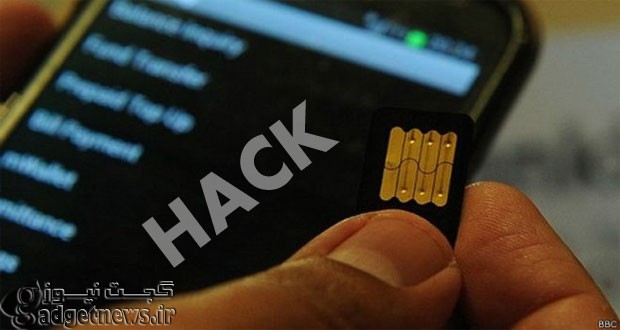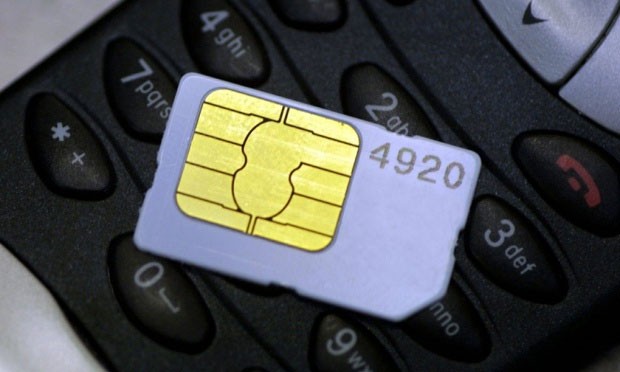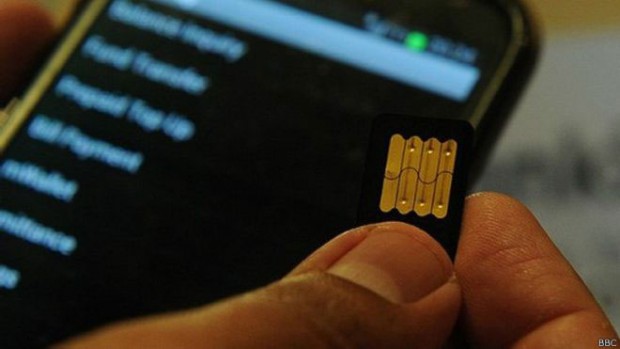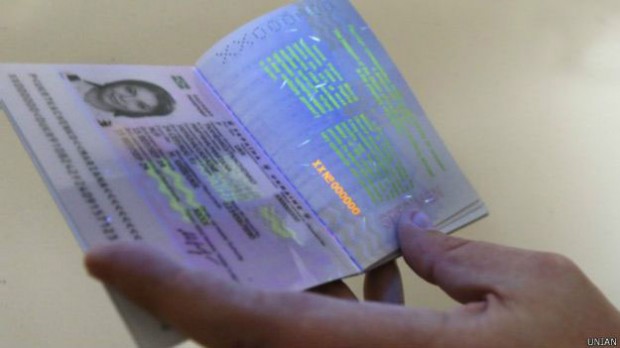دولتهای بریتانیا و آمریکا متهم شدهاند که سیم کارتهای یک شرکت بزرگ تولید کننده سیم کارت تلفن همراه را هک کردهاند.وبسایت اینترسپت که افشاگریهای ادوارد اسنودن – کارمند سابق یک شرکت مقاطعه کار سازمان امنیت ملی آمریکا – را منتشر میکند نوشته است که دستگاههای اطلاعاتی ایالات متحده و بریتانیا از این طریق، مکالمات و ارتباطات شمار زیادی از کاربران تلفنهای همراه را در جهان، شنود میکردند.
شرکت هلندی ژمالتو که هدف این هک قرار گرفته گفته که این اتهامها را “بسیار جدی” میگیرد.این شرکت ۴۰ کارخانه دارد و سیمکارتهای تولیدیاش در ۸۵ کشور به کار گرفته میشود.
وبسایتی که این اطلاعات را فاش کرده میگوید این “سرقت بزرگ سیمکارت” به سازمانهای جاسوسی آمریکا و بریتانیا امکان داده است که “به صورت مخفیانه حجم عظیمی از تماسهای تلفنی و اطلاعات تبادل شده بین تلفنهای همراه را شنود کنند.”
برخی از بزرگترین شرکتهای خدمات دهنده تلفن همراه مانند “ایتی اند تی”، “تی موبایل”، “ورایزن” و”اسپرینت” در میان مشتریهای این شرکت تولید کننده سیم کارت هستند.
این وبسایت مدعی شده که ستاد ارتباطات دولت بریتانیا که یک سازمان امنیت اطلاعات است و سازمان امنیت ملی آمریکا هک این سیم کارتها را برنامهریزی کردهاند و تیمی موسوم به “اماچایتی” یا تیم بهرهبرداری از تلفن همراه این عملیات را اجرا کرده است.
این دو سازمان تاکنون در این مورد مستقیما اظهارنظر نکردهاند اما ستاد ارتباطات دولت بریتانیا پیش از این تاکید کرده است همه فعالیتهایش “مطابق مقررات روشن قانونی و سیاستهایی که قانونی بودن، لازم بودم و متناسب بودن آنها را تضمین می کند انجام شده است.”
عملیات هک چطور انجام شده است؟
هر سیم کارت یک کلید رمزگذاری مشخص دارد که تولیدکننده تراشه آن را نصب میکند و ارتباطات میان تلفنهای همراه را امن نگه میدارد.
این بدان معنا است که اگر کسی قصد جاسوسی از پیامکها یا مکالمات تلفنی را داشته باشد اطلاعاتی درهم و رمزگذاری شده دریافت میکند.
اما اگر سازمان جاسوسی به کلیدهای اطلاعات رمزگذاری شده دسترسی داشته باشد میتواند از محتوای این اطلاعات مغشوش به محتوای اصلی تماسها دسترسی پیدا کند.
آنها با این کد حتی میتوانند تماسهای رمزگذاری شده قبلی را هم رمزگشایی کنند.
البته این شیوه فقط برای تماسهای تلفنی و پیامکها کاربرد دارد و ارتباطاتی که از طریق اپلیکیشنهای موبایل مانند واتزآپ، آیمسیج و بسیاری از سرویس های ایمیل انجام میشود به گونهای دیگر رمزگشایی میشوند.
به نوشته اینترسپت سازمانهای اطلاعاتی از طریق کدهای رمز دزدیده شده توانستهاند ارتباطات مبادله شده بین تلفنهای همراه را رمزگشایی کنند.
سرقت بدون ردپا
سخنگوی شرکت ژمالتو گفته است هنوز نمیتواند نفوذ به سیمکارتهایش را تایید کند و تصریح کرده که ممکن است دیگر شرکتهای تولید کننده سیم کارت هم هدف این هک قرار گرفته باشند.
او گفته که “ما گزارش منتشر شده را بسیار جدی میگیریم و همه منابعمان را به کار میگیریم تا در مورد هدف این تکنیک پیچیدهای که برای گرفتن اطلاعات سیم کارتها تلاش کرده تحقیق کنیم.”
اریک کینگ از مقامهای کارزار “پرایوت اینترنشنال” که یک سازمان فعال برای امنیت حریم خصوصی شهروندان است در واکنش به این گزارش از آژانس امنیت ملی آمریکا و ستاد ارتباطات دولت بریتانیا برای زیرپا گذاشتن قانون حریم خصوصی شهروندان انتقاد کرده و گفته که به خاطر جامعه و کسب و کار مردم لازم است سیستم ارتباطات قابل اعتمادی داشته باشیم و موج چنین اقدامهایی سراسر جهان را تحت تاثیر قرار میدهد.
شرکت ژمالتو برای تلفنهای همراه سیم کارت میسازد و آنها را به کدهای رمزی که اطلاعات را روی هر تلفن حفاظت شده نگه میدارد مجهز میکند.
وبسایت اینترسپت ادعا میکند که سازمانهای اطلاعاتی با نفوذ به ایمیلهای همکاران شرکت ژمالتو، هزاران کد رمز را دزدیدهاند و به این ترتیب آنها موفق شدهاند که به سادگی مکالمات تلفنی و پیامکها را بدون نیاز به اجازه شرکتهای ارتباطی یا دولتهای خارجی و بدون اینکه از خودشان رد پایی به جا بگذارند، استراق سمع کنند.
حلقه ضعیف امنیتی
کارلستن نول، یک محقق امنیتی که پیش از این درباره آسیب پذیری سیم کارتها اظهارنظر کرده به بیبیسی گفته است که “دور زدن رمز سیمکارتهای تلفن همراه خیلی کار سختی نیست.”
به گفته او شرکت ژمالتو که سازنده سیم کارتهاست این اطلاعات را رمزگذاری میکند و نه شرکتهای خدمات دهنده تلفن همراه و این باعث شده این شرکت هلندی ضعیفترین حلقه این زنجیره امنیتی باشد.
بقیه مشتریهای ژمالتو مثل آژانسهایی که گذرنامه ارائه میکنند تراشههای خام را دریافت میکنند و خودشان آنها را رمزگذاری میکنند.
سایت اینترسپت گفته است که منبع این اطلاعات درز شده ادوارد اسنودن است.
ادوارد اسنودن یک پیمانکار سابق سازمان امنیت ملی آمریکا (ان اس ای) بهار سال ۲۰۱۳ به همراه حجم زیادی از اسناد و اطلاعات فوق محرمانه از آمریکا خارج شد.
او در کشورش با اتهام جاسوسی روبرو است و در حال حاضر به عنوان پناهنده در روسیه زندگی میکند.
منبع: theguardian
Sim card database hack gave US and UK spies access to billions of cellphones
Sim card database hack gave US and UK spies access to billions of cellphones
American and British spies hacked into the world’s largest sim card manufacturer in a move that gave them unfettered access to billions of cellphones around the globe and looks set to spark another international row into overreach by espionage agencies.
The National Security Agency (NSA) and its British equivalent GCHQ hacked into Gemalto, a Netherlands sim card manufacturer, stealing encryption keys that allowed them to secretly monitor both voice calls and data, according to documents newly released by NSA whistleblower Edward Snowden.
The breach, revealed in documents provided to The Intercept, gave the agencies the power to secretly monitor a large portion of the world’s cellular communications, which experts said violated international laws.
Mark Rumold, staff attorney at the Electronic Frontier Foundation, said there was no doubt that the spy agencies had violated Dutch law and were in all probability violating laws in many other territories when they used the hacked keys.
“They have the functional equivalent of our house keys,” he said. “That has serious implications for privacy not just here in the US but internationally.”
The scale of the hack and its international reach will likely reopen wounds in the diplomatic community. The Obama administration faced intense criticism from Germany, Brazil and other nations following the Snowden leaks and has been working hard recently to repair the damage.
Previous documents disclosed by the Guardian showed Angela Merkel, the German chancellor, was the target of an NSA spying campaign, a revelation that has soured US-German relations. Brazil’s president Dilma Rousseff has already accused the NSA of violating international law.
“It’s a big breach,” Matthew Green, a cryptologist at the Johns Hopkins Information Security Institute, told the Guardian. “The problem is that the attacks could still be ongoing.”
Gemalto, the company targeted by the spy agencies, produces 2bn sim cards per year for clients including AT&T, Sprint, T-Mobile and Verizon. The Netherlands company operates in 85 countries around the world and provides cards to some 450 wireless network providers globally.
The stolen encryption keys would allow intelligence agencies to monitor mobile communications without the approval or knowledge of telecom companies and foreign governments.
Chris Soghoian, principal technologist at the American Civil Liberties Union, told the Guardian the hack would allow spies to “put an aerial up on the embassy in Berlin and listen in to anyone’s calls in the area”.
Calls made on 3G and 4G mobile networks are encrypted. But with the keys, which a GCHQ slide described as living “in the phone”, spies could access any communication made on a device unless its owner uses an extra layer of encryption.
— Micah Lee (@micahflee) February 19, 2015
NSA and GCHQ hacked into SIM card manufacturers, stealing all the crypto keys https://t.co/pK9LjFXOv5 pic.twitter.com/ZlHkh0vQxQ
Soghoian said the latest Snowden revelations meant that it was difficult for anyone to trust the security of a mobile phone. “It is very unlikely that this is an issue that is going to be fixed anytime soon,” he said. “There is no reason for people to trust AT&T, Verizon or anyone at this point. Their systems are hopelessly insecure.”
“The real value of this is that it allows bulk surveillance of telecoms without anyone getting caught,” Soghoian said of hacks like the one at Gemalto, which he said would allow the spy agencies to target “whoever they wanted”.
“In countries where the government will not cooperate, that’s very useful,” he said. “It’s also very useful in countries where the government would help. Germany would allow spy on a suspected terrorist but not on [Angela] Merkel.”
Paul Beverly, a Gemalto executive vice president, told The Intercept that the company was totally oblivious to the penetration of its systems. “I’m disturbed, quite concerned that this has happened,” he said. “The most important thing for me is to understand exactly how this was done, so we can take every measure to ensure that it doesn’t happen again.”
According to the Snowden documents, Gemalto was targeted by the Mobile Handset Exploitation Team (MHET), a unit formed by the NSA and GCHQ in April 2010 to target vulnerabilities in cell phones.
The Intercept reports that in one GCHQ slide, the British intelligence agency boasted it had planted malware – malignant software – on several of Gemalto’s computers, giving GHCQ access to “their entire network”.
Green, from Johns Hopkins, said the scale of the hack – “apparently a huge percentage” of the sim cards at Gemalto – would mean a massive replacement process.
“Suppliers are going to have to tighten up their practices before anyone can think about fixing this,” he told the Guardian, “and that’s going to be a nightmare.”
The keys were obtained after a clandestine operation targeting the email and Facebook accounts of Gemalto employees and other telecom executives. GCHQ operatives singled out key individuals within Gemalto and then hacked their private accounts.
One Gemalto employee in Thailand was identified as “a good place to start” after he was observed sending encrypted files, a move the agents suggested meant he was sending valuable information.
 گجت نیوز آخرین اخبار تکنولوژی، علم و خودرو
گجت نیوز آخرین اخبار تکنولوژی، علم و خودرو 










